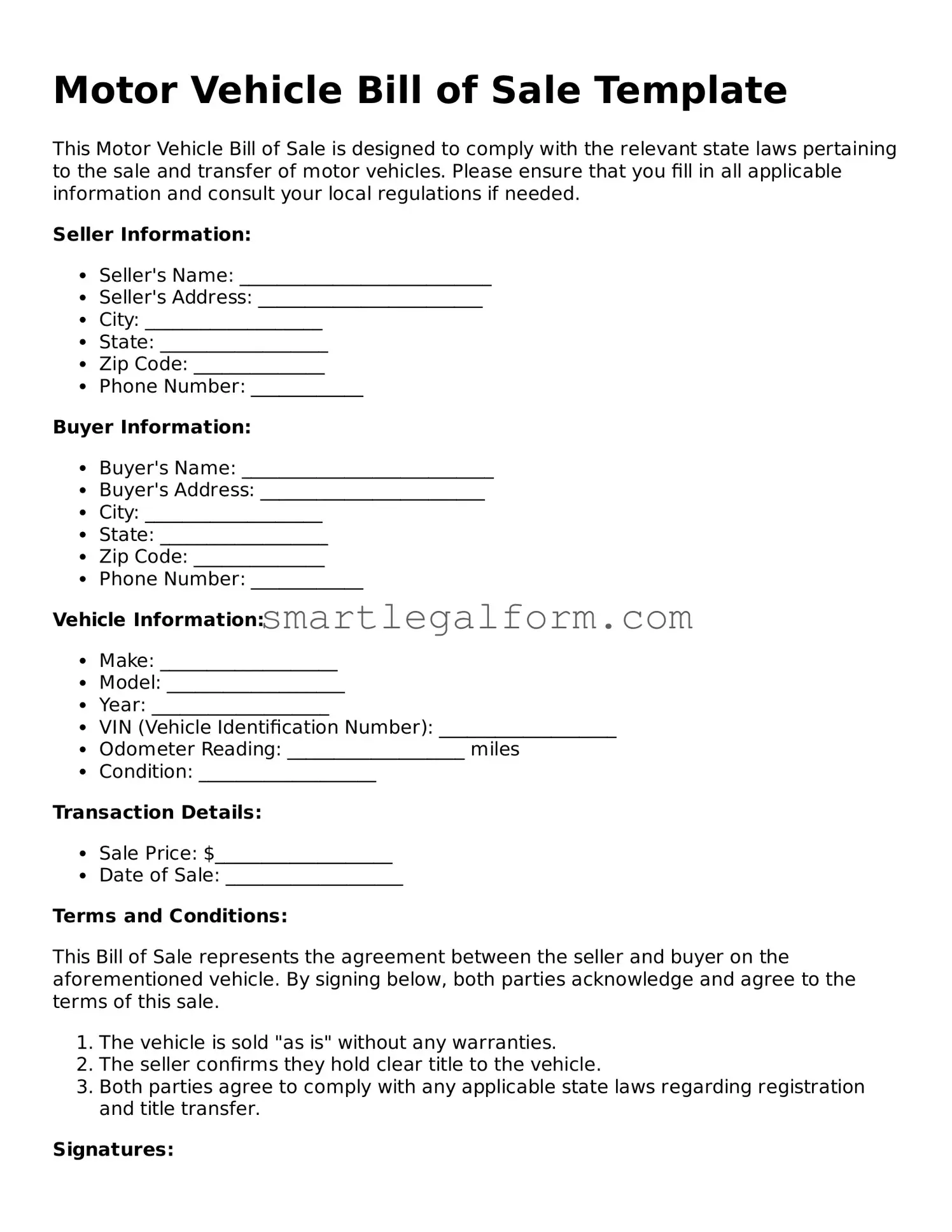Attorney-Approved Motor Vehicle Bill of Sale Form
Motor Vehicle Bill of Sale for Particular US States
Form Preview Example
Motor Vehicle Bill of Sale Template
This Motor Vehicle Bill of Sale is designed to comply with the relevant state laws pertaining to the sale and transfer of motor vehicles. Please ensure that you fill in all applicable information and consult your local regulations if needed.
Seller Information:
- Seller's Name: ___________________________
- Seller's Address: ________________________
- City: ___________________
- State: __________________
- Zip Code: ______________
- Phone Number: ____________
Buyer Information:
- Buyer's Name: ___________________________
- Buyer's Address: ________________________
- City: ___________________
- State: __________________
- Zip Code: ______________
- Phone Number: ____________
Vehicle Information:
- Make: ___________________
- Model: ___________________
- Year: ___________________
- VIN (Vehicle Identification Number): ___________________
- Odometer Reading: ___________________ miles
- Condition: ___________________
Transaction Details:
- Sale Price: $___________________
- Date of Sale: ___________________
Terms and Conditions:
This Bill of Sale represents the agreement between the seller and buyer on the aforementioned vehicle. By signing below, both parties acknowledge and agree to the terms of this sale.
- The vehicle is sold "as is" without any warranties.
- The seller confirms they hold clear title to the vehicle.
- Both parties agree to comply with any applicable state laws regarding registration and title transfer.
Signatures:
Seller's Signature: ____________________________ Date: ________________
Buyer's Signature: ____________________________ Date: ________________
This document should be kept for your records and may be required for future transactions or registrations pertaining to the vehicle.
Common mistakes
Filling out a Motor Vehicle Bill of Sale form can seem straightforward, but many individuals make common mistakes that can lead to complications later. One frequent error is failing to include all necessary information about the vehicle. Essential details such as the Vehicle Identification Number (VIN), make, model, and year must be accurately recorded. Omitting any of these can create confusion and may even invalidate the sale.
Another mistake often made is not providing complete buyer and seller information. Both parties should include their full names, addresses, and contact details. Incomplete information can lead to disputes or difficulties in transferring ownership. It is crucial to ensure that both the seller and buyer are clearly identified in the document.
Many individuals overlook the importance of signatures. Both the seller and buyer must sign the Bill of Sale for it to be legally binding. Failing to do so can result in challenges when trying to register the vehicle or prove ownership. Ensure that both parties understand the need for their signatures and that they are placed in the appropriate section of the form.
Another common oversight is neglecting to specify the sale price. The amount agreed upon for the vehicle should be clearly stated. This not only helps in establishing the terms of the sale but also plays a crucial role in tax assessments and future transactions. Without a defined sale price, the form may be deemed incomplete.
People sometimes forget to date the document. Including the date of the transaction is essential for record-keeping and legal purposes. A dated Bill of Sale can serve as proof of when the vehicle changed ownership, which may be important in case of disputes or for future reference.
Lastly, individuals often fail to keep copies of the completed Bill of Sale. After signing, both the buyer and seller should retain a copy for their records. This serves as a safeguard in case any issues arise regarding the sale or ownership of the vehicle. Having a copy can provide peace of mind and help resolve any potential disputes.
Dos and Don'ts
When filling out the Motor Vehicle Bill of Sale form, it’s important to follow some guidelines to ensure everything is completed correctly. Here’s a list of things you should and shouldn’t do:
- Do include the full names and addresses of both the buyer and seller.
- Do provide accurate vehicle information, including the make, model, year, and VIN.
- Do specify the sale price clearly.
- Do date the form when the transaction takes place.
- Do sign the document in the designated areas.
- Don’t leave any fields blank; fill in all required information.
- Don’t use white-out or erase any mistakes; instead, cross out errors neatly and initial them.
- Don’t forget to keep a copy for your records after the transaction.
- Don’t sign the form until you are sure all information is correct.
- Don’t rush through the process; take your time to ensure accuracy.
More Types of Motor Vehicle Bill of Sale Forms:
Rv Bill of Sale Printable - The RV Bill of Sale does not guarantee the RV's condition; buyers should verify before purchase.
Similar forms
- Sales Contract: Similar to a Motor Vehicle Bill of Sale, a sales contract outlines the terms of a transaction between a buyer and a seller. It details the item being sold, the price, and the responsibilities of both parties.
- Title Transfer Document: This document is essential for transferring ownership of a vehicle. Like the Bill of Sale, it serves as proof of ownership and must be filed with the relevant state authority to complete the transfer.
- Purchase Agreement: A purchase agreement is a formal document that specifies the conditions under which a vehicle is sold. It often includes payment terms, delivery details, and warranties, similar to the information found in a Bill of Sale.
- Vehicle Registration Application: This document is used to register a vehicle with the state. While it is not a sales document, it often requires information that is also found in the Bill of Sale, such as the buyer's and seller's details and vehicle identification.
- Warranty Deed: Though typically associated with real estate, a warranty deed ensures that the seller has the right to sell the property and guarantees that the buyer will receive clear title. This concept parallels the assurances provided in a Bill of Sale regarding the vehicle's ownership and condition.
